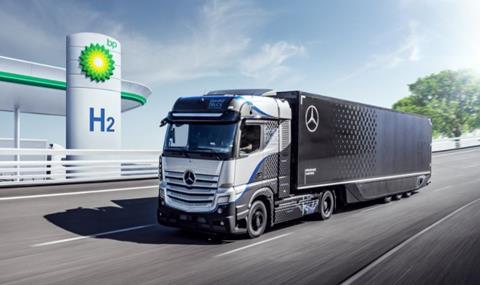
Daimler Truck and BP have teamed up to deliver hydrogen-powered fuel-cell HGVs and deploy the infrastructure required for refuelling the vehicles in the UK by the end of the decade.
Under their memorandum of understanding, Daimler said it expected to be able to offer hydrogen-powered trucks to UK customers by 2025 and BP intends to design, construct, operate and supply 25 hydrogen refuelling stations by 2030.
Karin Rådström, CEO of Mercedes-Benz Trucks, said: “Together with BP, we want to jointly develop and scale the required hydrogen infrastructure by putting our hydrogen-powered fuel-cell trucks into our customers’ hands and thus supporting the decarbonisation of the UK freight network.”
BP said hydrogen was “critical to decarbonising hard-to-abate sectors” and that for heavy and long distance freight the clean fuel was sometimes the only answer: “Working with a leading manufacturer like Daimler Truck, we can accelerate the deployment of both vehicles and infrastructure and pioneer the use of hydrogen to fuel the next generation of UK freight,” said Emma Delaney, BP executive vice president for customer and products. “From producing and supplying hydrogen through to building and operating the fuelling stations, BP is perfectly positioned to transform transport and ultimately build a better energy future.”
Daimler Truck said its ambition was to offer only vehicles that are CO2-neutral in Europe, North America and Japan by 2039.
It is currently focused on both CO2-neutral technologies, battery power and hydrogen-based fuel-cells, but it also said it had “a clear preference for liquid hydrogen”.
“In this state, the energy carrier has a far higher energy density in relation to volume than gaseous hydrogen,” the manufacturer said.
“As a result, the tanks of a fuel-cell truck using liquid hydrogen are much smaller and, due to the lower pressure, significantly lighter.
“This gives the trucks more cargo space and a higher payload.”













